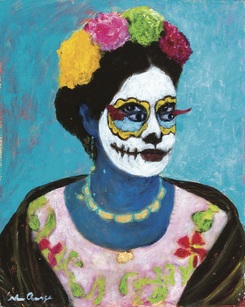|
Day of the Dead is a tradition built through memories that live in the heart and blood of the Mexican culture and dates back to the pre-Hispanic era; and so the celebration is passed from generation to generation, and from soil to soil. Day of the Dead comes to Alaska with every Mexican who builds his or her home here and forms a family. It advanced gradually at first, like small waves that palpitate ashore slowly; but over decades, and with more Alaskans of Mexican descent, the small waves grew into a cultural force. Mexicans celebrating this holiday offer a philosophy that enriches Alaskans’ lives by spurring the community to embrace and honor its ancestors. Every year we give the departed loved ones an opportunity to visit us through the altars we make and to continue building memories with us. Someday within the celebration we will be remembered by our children and by those who come after. One day the memory of us will provide nourishment to our culture, and that cycle continues, yesterday, today, and tomorrow when the memories come together in the Day of the Dead.
The Day of the Dead was first held in the Anchorage Latino community in 2004. A single altar in a space of only 130 square feet was enough to seed the flowers of the celebration. Today they have blossomed through participation of those who followed their paths to the celebration of November 2. It is important for our individual memories to join our collective memory, this year and throughout time; and just as important that the Latino community unites in opening the ceremony’s doors to everyone. Every year celebrating the Day of the Dead becomes more important, because our generations are growing and as they grow our identity is shaped by our lives in Alaska. Regarding the Mexicans who are part of it, we must unite, act sincerely, and grow in a healthy way. Let us repair damaged relationships and speak in a language of acceptance, love, and fraternity. And so everyone is invited to participate. We will honor our ancestors, create memories and save them from oblivion; the final death can wait. |
|
